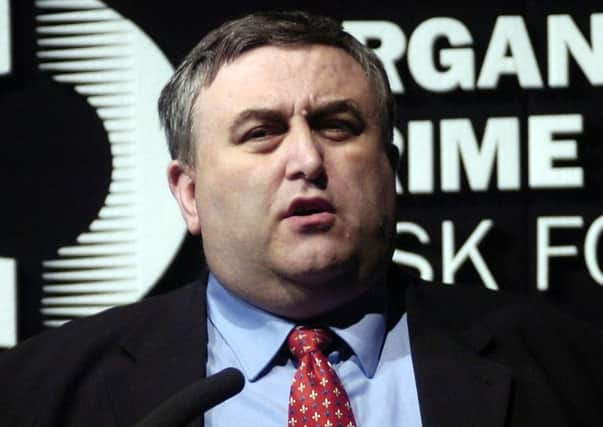Unionists badly need a leader like McGuinness: former RUC deputy


Alan McQuillan said despite Mr McGuinness’s bloody background, the Sinn Fein man had also been highly competent at managing the peace process – and “we’ll all really miss him”.
Mr McQuillan, one of the RUC’s top brass during the period when it changed into the PSNI at the turn of the millennium, echoed the view of others in recent days when he said Mr McGuinness alone had the power to steer the IRA away from bullets and bombs.
Advertisement
Hide AdAdvertisement
Hide AdMr McQuillan said that since Mr McGuinness’s death was announced almost a fortnight ago, Sinn Fein’s PR machine has gone into “overdrive” by denying that he was a terrorist.
“The reality is he was a terrorist, a very brutal terrorist. He and his organisation murdered many people,” said Mr McQuillan.
“He then changed – when the pressure had come on to such an extent that PIRA were forced to give up their campaign because they were simply not succeeding.
“He was one of the key people in making that transition – he did make it well.
Advertisement
Hide AdAdvertisement
Hide Ad“In many ways, one of the great failings of unionism is that they have never produced someone with the leadership skills of McGuinness. They won’t like to hear that. But they really need a leader like McGuinness.
“I think if McGuinness was still here today, we wouldn’t be in the position we are in – a deal would have been found, and he would have driven it forward from the republican side. I think they sorely miss him.”
Mr McQuillan said he “disagreed fundamentally with many issues” of Mr McGuinness’s agenda.
“But he was very straightforward. He was negotiating. He could work with people. He was competent. And he did, I think, solve many problems and take things forward.
“But that doesn’t excuse the first half of his career.”
Advertisement
Hide AdAdvertisement
Hide AdThe book ‘Martin McGuinness: From Guns To Government’ gives a list of McGuinness’s convictions – READ THEM HERE AT THIS LINK.
After the mid-1970s, the only convictions he received were for comparatively petty offences; minor assaults on police, obstruction, traffic offences.
The book’s authors, Liam Clarke and Kathryn Johnston, said that there was “a willingness to keep McGuinness in play” by the authorities, evidenced by the fact there “was no will to deprive him of his liberty”.
Mr McQuillan said: “The reality is it was extremely difficult to get the godfathers of terrorism because they were so well insulated from what was happening on the streets.
“It was very, very hard to get them.
Advertisement
Hide AdAdvertisement
Hide Ad“Plus, you’ve got to remember that from the early 1980s onwards, the British government had a very clear focus on creating the peace process.
“The peace process is really the creation of the British government. It was developed and fostered, and Sinn Fein were herded into politics and prodded in the right direction with the assistance of the Americans and the Irish.
“I think as part of that there was a desire not to rock the boat...
“Of course, the boat did get rocked from time to time.”
He added: “In the mid-80s when I was working in police headquarters, I was involved in discussion with senior officials in NIO about how the peace process could be created.
“This is long before the official peace process starts.
Advertisement
Hide AdAdvertisement
Hide Ad“They were very clearly focused from about ‘85, just immediately after the hunger strikes onwards, about how they could develop a peace process, and how they could create the conditions in which that could develop...
“Don’t forget, that’s in the hated Thatcher era.
“I don’t think Thatcher knew quite how far some of it was going.”
He said that from 1990, when the Northern Ireland secretary Peter Brooke said in a speech that Britain had “no selfish strategic interest” in the Troubles, there was a “one seamless process” under way, culminating in the Good Friday Agreement.
He added: “Blair just happened to be there at the end.”
When it comes to McGuinness’ involvement in the peace process, he said: “His hand was forced to an extent, but it could have taken a hell of a lot longer.
Advertisement
Hide AdAdvertisement
Hide Ad“He is one of the people who grasped the realities quickly ... He was the only person in the movement who had the authority and drive, especially with the hard men, to actually do it.
“His reputation was much stronger than Adams’s.
“I think they’ll really miss him. And I think we’ll all really miss him. Because, as I’ve said, I think that if he’d been around today we wouldn’t be in this situation we’re in today. I think we’d have moved forward.”